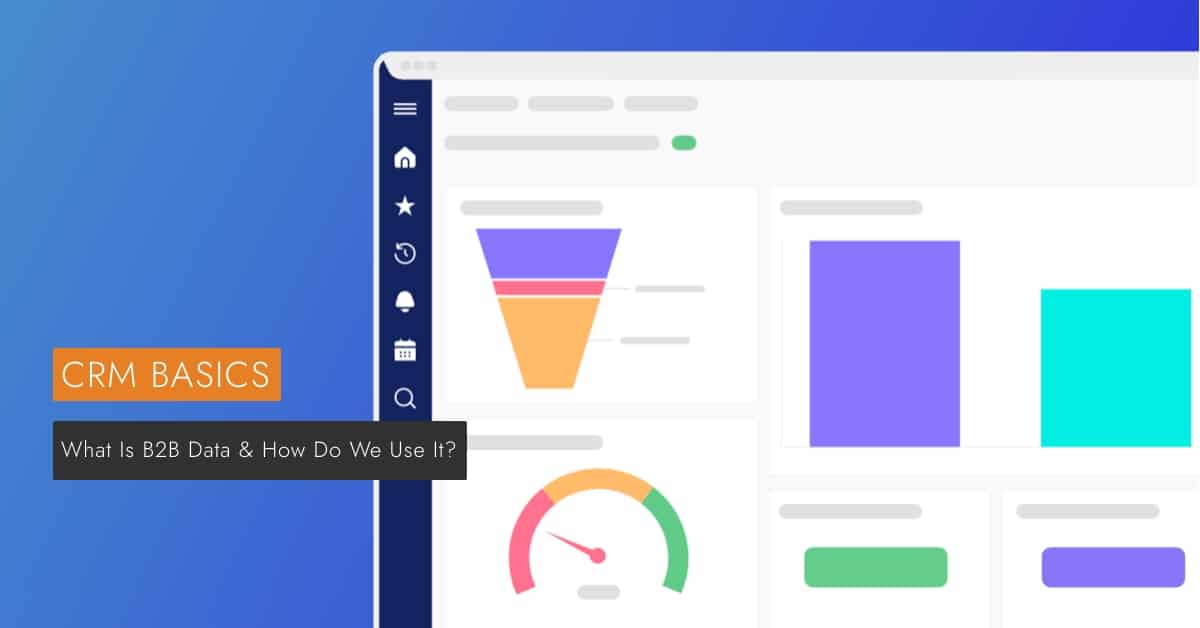What Is B2B Data & How Do We Use It?

B2B data is information about companies, their products, and their customers. It’s the information that other B2B companies would use to plan their sales and marketing strategies.
B2B data can be collected in several ways, including surveys, lead forms, data collection agencies, and social media. And the more data you have, the easier it is to create accurate, actionable reports and marketing strategies.
This post discusses what B2B data is and how to leverage it to improve your sales and marketing.
How to Use B2B Data to Improve Your Sales and Marketing
Data is the lifeblood of marketing. It provides companies with insights into their customers’ needs, behaviours, preferences, and interests. Without data, marketers are essentially shooting in the dark when creating campaigns that target specific types of individuals or organisations. Here are ways you can use B2B data to improve your sales and marketing.
Find Relevant Prospects
One of the most important things marketers should be doing is finding prospects to target. This involves researching potential customers who are likely to purchase or engage with your product or service. You can use B2B data like reliable demographic insights and key business metrics to find relevant individuals and organisations that match what you’re looking for in a potential prospect.
Find New Prospects
Once you have identified your relevant prospects, it’s time to find new ones that will amplify the impact of your campaigns. Using B2B data, such as social media insights and industry trends, can help you zero in on specific individuals who are more likely to be receptive to your products and services.
Find Potential Employees
In addition to finding new prospects, you must find potential employees for your organisation too. Not only will this help you build your talent pool, but it will also allow you to expand the reach of your business by providing a broader range of experiences and knowledge. B2B data, such as career site statistics and social media data, can help you find new prospects looking to join your company.
Find Influencers
One of the biggest challenges marketers face is getting a return on their marketing efforts. This involves knowing what worked and what didn’t so they can improve future strategies accordingly. We already know that 85% of marketers say they don’t know if their campaigns generate ROI. You can find out by identifying influencers within your industry that can help amplify the reach of your messages and content.
Create Accurate Customer Profiles
Having an accurate customer profile is vital to understanding your audience better. It helps you to speak the correct language and anticipate your customers’ needs and behaviours. This is where B2B data can help you create an accurate customer profile by providing valuable information about your customers’ demographics, behaviour, and preferences.
Create Useful Customer Personas
Once you’ve created your accurate customer profiles, it’s time to identify common traits so you can build your personas. B2B data, such as purchase history data and survey insights, can help you understand how your customers use your product or service, so that you can create valuable personas for your marketing campaigns.
Improve Your Marketing Efforts
Once you have an accurate customer profile of the individuals who are most likely to be receptive to your messaging, it’s time to improve your marketing efforts.
You can use B2B data to create an actionable strategy that will give you control over the amount of time and effort you put into various marketing channels (e.g., social media). The more informed you are about how customers prefer to receive content, the better your marketing efforts will be.
Improve Your Sales Efforts
If you’re using B2B data to understand your customers’ wants and needs, it makes sense that you would also use this information to improve your sales efforts as well. Knowing how their buying process works, what matters most to them, and their objections means you can have relevant conversations with them. And this will lead to an improved sales process overall.
Popular Industries that Use B2B Data
The beauty of B2B data is that it can be used across various industries, from marketing to finance. This allows you to make informed business decisions based on B2B data and create strategies around these insights. Here are some of the most common industries using B2B data:
- Financial Services: Finance companies use B2B data to understand their customers’ financial needs and make predictions about future trends in the industry.
- Insurance: Insurance companies use B2B data to create highly targeted marketing campaigns and improve their products and services. They can use B2B data to determine which customers are most likely to cancel their insurance policies. They can then proactively approach these individuals with a tailored offer that will encourage them not to cancel.
- Technology: Technology companies rely on B2B data to provide personalised products and services to their customers. They can also integrate B2B data with their CRM software to deliver an optimal customer experience and identify individuals who need support.
- Marketing: Marketing teams rely on B2B data to inform their messaging and lead generation efforts. They use B2B data alongside social listening tools to understand how their customers engage with others in their industry.
Conclusion
With 75% of marketers struggling to find the right target audience, businesses of all sizes need to consider their marketing efforts carefully. While it may take some time to identify new prospects using B2B data, its benefits are well worth it. Don’t wait any longer; start leveraging B2B data for profitable marketing.
